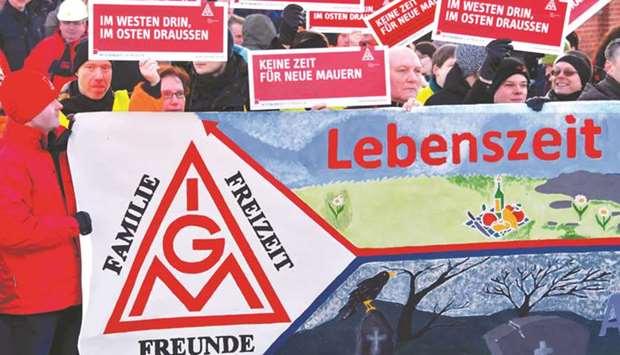German
industrial workers staged strikes at metals and engineering firms
yesterday in support of wage claims by union IG Metall, which announced a
further wave of walkouts for today.
With the economy in robust
health and unemployment at record lows, the country’s biggest union is
demanding an inflation-busting 6% pay hike this year for about 3.9mn
workers, as well as a shorter work week.
IG Metall wants workers to have the option to temporarily switch to a 28-hour week in the pursuit of better work-life balance.
Even
more controversially, it wants shift workers and those caring for
children or elderly relatives to be compensated for some of the salary
loss that would come with clocking up fewer hours.
Employers say such a drastic change would be illegal and have threatened to go to court to stop the industrial action.
Ahead
of regional negotiations due to begin on Thursday, employers have so
far offered 2% plus a one-off €200 ($240) payment in the first quarter.
Yesterday
more than 3,000 employees downed tools at sports car maker Porsche in
Stuttgart, and around 400 at elevator maker OTIS in Berlin were expected
to do likewise.
Night shift workers at automotive supplier Kirchhoff
in the industrial heartland state of North Rhine-Westphalia also walked
out, as did personnel at farming machinery maker Claas.
“The
employers provoked these warning strikes with their behaviour at the
negotiating table,” Knut Giesler, head of IG Metall in North
Rhine-Westphalia, said.
In the state, also Germany’s most populous,
IG Metall has called for stoppages at 143 companies today, including
Lumileds, the LED components and car lighting business of Philips, and
Thyssenkrupp unit Rothe Erde in Dortmund.
Up to 700,000 are expected
to join a week of so-called “warning strikes”, a familiar feature of the
annual collective bargaining process that sees workers downing tools
for a few hours to demonstrate at factory gates and in town squares.
Industrial
action is scheduled to the south in Bavaria, home to premium carmaker
BMW and engineering group Siemens, where the union is threatening to
shift from short warning strikes lasting only a few hours to full-day
stoppages.
The dispute follows a strong year of growth in Europe’s
largest economy, driven by domestic demand from record numbers of German
workers while borrowing costs and inflation remain low and exporters
benefit from a global recovery.
That pattern should extend through 2018, with the Ifo economic institute last month forecasting growth of 2.6% for the year.
Talks
between unions and employers’ associations are set for Thursday in the
state of Baden-Wuerttemberg, where Volkswagen’s Porsche, Mercedes-Benz
maker Daimler and automotive suppliers including Bosch are based.
In Bavaria, negotiations will resume on January 15, and in North Rhine-Westphalia on January 18.
The
latter state’s sector employers’ association, Metall NRW, said the
strikes risked damaging Germany industrial companies’ reputation as
reliable suppliers.
“I expect the union to take action at the
negotiating table and not out in the streets,” Metall NRW director
Luitwin Mallmann said in a statement.
IG Metall has not organised a nationwide, open-ended strike in Germany since 2003.
Boasting
some 2.3mn members, IG Metall is Europe’s largest trade union,
representing workers of all kinds in industrial conglomerates like
Siemens or Thyssenkrupp, steelmaking, the auto industry, electronics and
textiles.
The sheer weight of the metal and electrical industries’
3.9mn workers often draws other sectors along in its wake when it comes
to pay deals – and 2018’s showdown could make for massive changes.
Unions are demanding a pay rise of 6% this year.
While the figure is triple bosses’ initial offer of 2%, it is a classic starting position to wring out a compromise.
Far
more contentious is their other headline demand – the right for workers
to switch from 35 to 28 hours per week for up to two years, with the
employer guaranteeing the right to return to full-time work – as well as
paying some of the salary shortfall in certain cases.
IG Metall says the proposal would give workers a better quality of life.
“Workers
aren’t only workers, they have personal lives, children, old parents,
all that must be taken into account. Working life can’t only be about
sacrifice,” Berlin IG Metall chief Olivier Hoebel told hundreds of
strikers demonstrating in the capital with bibs in the union’s signature
red colour and whistles in hand.
Employers fear up to two-thirds of
workers could be eligible, leaving factory floors bare and prompting a
new administrative tangle.
And they argue that the change would be unfair to those who have already taken a pay cut when switching to part-time.
The
Gesamtmetall employers’ federation has blasted the demands and any
industrial action workers take to achieve them as outright “illegal”,
threatening to take the question to court.
Industry leaders in metal
and electricals – key sectors for the German economy that are in
otherwise rude health – are keen to avoid a drawn-out industrial
dispute.
“In general, strikes are not an appropriate means to resolve
salary disputes. They hurt exports, and thereby the company and in the
end the employees,” said Bertram Brossardt, head of the employers’
association for the sector in southern state Bavaria.
With the German
economy pumped up by strong exports and domestic demand, a labour
market swept clean of skilled workers and low inflation, most of the
cards appear to be in IG Metall’s hand going into the talks.
“We need
a clear signal from bosses that they’re interested in a solution for
the question of working hours,” IG Metall chief for southwestern Germany
Roman Zitzelsberger said on Sunday.
Otherwise, “it will be extremely difficult to get through the talks with just warning strikes”, he cautioned.

Workers of the Bombardier plant hold posters with the IG Metall logo as they stage a warning strike early yesterday in Hennigsdorf near Berlin, northeastern Germany. The words read ‘Family u2013 leisure time u2013 friends u2013 lifetime’.
